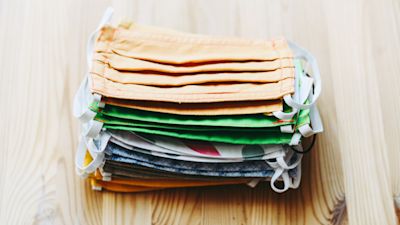Covid: The best and worst face coverings for slowing spread of coronavirus

Video report by ITV News Consumer Editor Chris Choi
Retailers and manufacturers are being urged to "up their game" after lab tests revealed huge differences in effectiveness of the best and worst face coverings in helping slow the sread of Covid-19. An investigation by consumer magazine Which? found some face coverings were so ineffective, they failed to capture 93% of harmful particles and were a branded a 'Don't Buy' by the team of scientists. Which? research looked at a range of brands and styles of face coverings and masks, including those sold by pharmacy chains, supermarkets, high street stores and online retailers.
Homemade masks were also tested alongside shop bought versions and found to be more effective than many commercial coverings.
Researchers found the best performing face coverings were able to block more than 99% of potentially harmful bacterial particles – similar to the standard of surgical masks. But the worst only managed to filter out a mere 7%. The Which? tests also revealed the filtration of nearly all face coverings was improved after being washed at high temperatures as this compressed the fibres in the fabric. Scientists tested the face coverings for how well they filter bacteria, how breathable they are, and how they fare after multiple washes. The Which? test have also shown using a tightly woven cotton for a homemade mask is a good option; two layers of tightly woven cotton were able to filter 73% of particles before washing and 81% after five hot washes, a result described as "impressive" by the researchers.
Watch our guide on how to make your own DIY face covering:
At the bottom of the table and awarded just one star each by the scientists were a face covering from Termini8 sold at Lloyds Pharmacy (£2), one from Asda (£3) and one from Etiquette (£3), which is sold at Superdrug. All were made with only one layer which affected their ability to filter potentially harmful particles.
The lab tests revealed masks with multiple layers are much more effective than single layer masks at filtering particles. At the other end of the scale were a NEQI reusable face mask (£15 for 3), and Bags of Ethics Great British Designer face coverings (£15 for 3), available at Asos and John Lewis.
Which? recommended face coverings
NEQI Reusable Face Masks, £15 for three (£5 per mask)Which? score: 81%
Bags of Ethics Great British Designers Face Coverings, £15 for three (£5 per mask)Which? score: 80%
Best for glasses
Asos design Palm Print face covering Typical price £12 Which? score: 80%
AB Mask Reusable Antibacterial MaskWhich? score: 73%
But the researchers found there was a trade off between breathability and the masks filtering effectiveness - the fabric masks that scored five out of five for filtration scored the lowest for breathability.
There is some evidence that if a face covering is not breathable, it can get damp with the user's breath which may encourage people to adjust or remove their mask, especially if they wear glasses. Face coverings that scored highly for effectiveness, but low for breathability included:
Firebox reusable mask (£15), which is made with double-layered polyester and uses a double filter
Maskie Loop UV Sanitized reusable Face Mask (£6), which is made of three layers
Smart Mask (£14), which is also made of three layers and markets itself as the number one rated face mask in the UK
AB Mask (£10), received full marks for filtration but got two stars for breathability.
The Asos (£12) and AB Mask were the only two that avoided glasses steaming up and were rated highest for glasses-wearers’ comfort, with both scoring five stars in this category.
How to wear a face covering
According to the UK’s Health and Safety Executive, a face covering should:
cover your nose and mouth while allowing you to breathe comfortably
fit comfortably but securely against the side of the face
be secured to the head with ties or ear loops
be made of a material that you find to be comfortable and breathable, such as cotton
ideally include at least two layers of fabric (the World Health Organisation recommends three depending on the fabric used)
unless disposable, it should be machine washable
How often do you wash your reusable facemask? Watch our guide
While reusable fabric face coverings are not designed to block ultra-fine particles such as Covid-19 like a medical respirator mask would, they will block larger droplets and aerosols breathed out by the wearer. Natalie Hitchins, Which? Head of Home Products and Services, said: “With face coverings now such an important part of daily life, they not only need to be durable and comfortable, but also provide effective filtration from harmful particles in order to keep us and others safe. “Our results prove that there is a huge difference in quality between reusable masks sold in stores around the country and online.
"We would urge manufacturers to use our findings to up their game and improve their products – until then it is worth taking time to research the best option for yourself and your loved ones.”